
Johann David Ludwig Graf Yorck von Wartenburg was a Prussian Generalfeldmarschall instrumental in the Kingdom of Prussia ending an alliance with France to form one with Russia during the War of the Sixth Coalition. Ludwig van Beethoven's "Yorckscher Marsch" is named in his honor.

August Wilhelm Antonius Graf Neidhardt von Gneisenau was a Prussian field marshal. He was a prominent figure in the reform of the Prussian military and the War of Liberation.

Ludwig Adolf Wilhelm Freiherr von Lützow was a Prussian general notable for his organization and command of the Lützow Freikorps of volunteers during the Napoleonic Wars.
The Grand Cross of the Iron Cross was a decoration intended for victorious generals of the Prussian Army and its allies. It was the second highest class of the Iron Cross, following the Star of the Grand Cross of the Iron Cross, which was awarded only twice. Along with the Iron Cross 1st and 2nd Class, the Grand Cross was founded on 10 March 1813, during the Napoleonic Wars. It was renewed in 1870 for the Franco-Prussian War and again in 1914 for World War I. In 1939, when Adolf Hitler renewed the Iron Cross as a German decoration, he also renewed the Grand Cross.
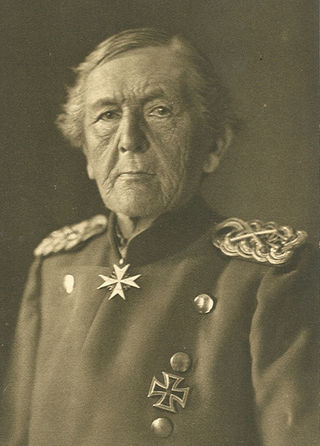
Gottlieb Ferdinand Albert Alexis Graf von Haeseler was a German military officer of the Imperial Wilhelmine period, with final rank of Generalfeldmarschall.

The Battle of Dennewitz took place on 6 September 1813 between French forces commanded by Marshal Michel Ney and the Sixth Coalition's Allied Army of the North commanded by Crown Prince Charles John of Sweden, Friedrich Wilhelm von Bülow and Bogislav von Tauentzien. It occurred in Dennewitz, a village in the Prussian province of Brandenburg, near Jüterbog, 40 kilometres (25 mi) southwest of Berlin. The battle marked a turning point in the German Campaign of 1813 as not only did the Allied victory end Napoleon's hopes of capturing Berlin and knocking Prussia out of the war, but the severity of the French defeat, inflicted by a primarily Prussian force, also led to the erosion of fidelity of German allies to the Napoleonic cause. The French losses, and consequent diplomatic reverses, that resulted from Dennewitz contributed greatly to Napoleon's defeat a month later at the Battle of Leipzig.

Johann Adolf, Freiherr von Thielmann was a Saxon general who served with Saxony, Prussia and France during the Napoleonic Wars.

Friedrich Emil Ferdinand Heinrich von Kleist, granted the title Graf Kleist von Nollendorf from 1814 onwards, was a Prussian field marshal and a member of the old junker family von Kleist. He was a prominent figure in Prussian military during the Napoleonic Wars.

Heinrich Burggraf und Graf zu Dohna-Schlobitten was a German major general and resistance fighter in the 20 July Plot to assassinate Adolf Hitler at the Wolf's Lair in East Prussia. He was a Knight of Justice of the Order of St John, which was regarded with disfavour by the Nazis.

Hans Ernst Karl, Graf von Zieten was an officer in the Prussian Army during the Napoleonic Wars.
Friedrich Leopold Freiherr von Schrötter was a German Junker, Prussian government minister and until 1806 Reichsfreiherr of the Holy Roman Empire of the German Nation.

Bogislav Friedrich Emanuel Graf Tauentzien von Wittenberg was a Prussian general of the Napoleonic Wars.

Alexander Freiherr von Spaen was a Generalfeldmarschall of Brandenburg-Prussia.

Otto Christoph Freiherr von Sparr was a Generalfeldmarschall of Brandenburg-Prussia.

Wilhelm Dietrich Freiherr von Buddenbrock was a Prussian Generalfeldmarschall and cavalry leader.
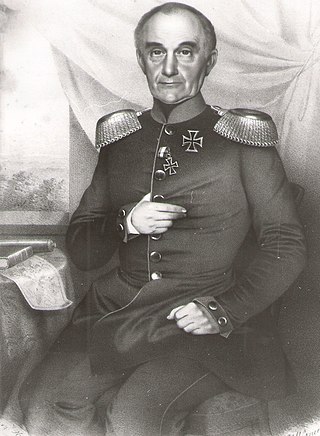
Karl Wilhelm Freiherr von Willisen was a Prussian general.
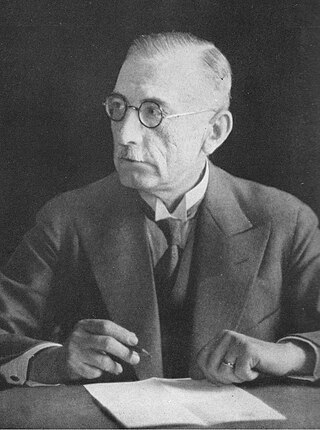
Wilhelm Moritz Egon Freiherr von Gayl was a German jurist and politician of the German National People's Party (DNVP).
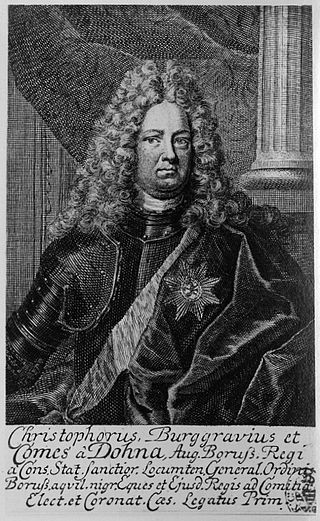
Christopher I, Burgrave and Count of Dohna-Schlodien was a Prussian general and diplomat.

Günther Emanuel Graf von Kirchbach was a German Generaloberst who served during the First World War.
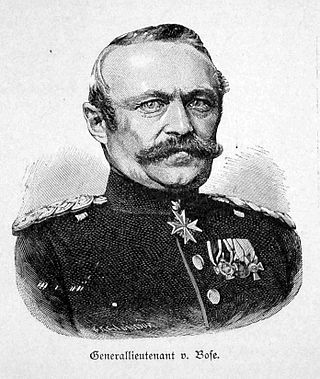
Friedrich Julius Wilhelm Graf von Bose was a Prussian general who commanded the Prussian XI Corps during the Franco-Prussian War.





















